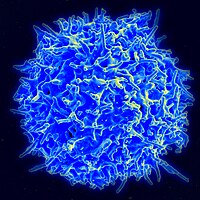
Photo from wikipedia
Introduction The elderly population suffers from the natural process called immunosenescence, which may be related to the high mortality rates it has against the SARS-CoV2 virus, which is why therapies… Click to show full abstract
Introduction The elderly population suffers from the natural process called immunosenescence, which may be related to the high mortality rates it has against the SARS-CoV2 virus, which is why therapies that improve the immune status are required. The combined treatment of the VA-MENGOC-BC® (V-BC) vaccine and the Biomodulina T® (BT) drug could achieve this purpose. This treatment could immunomodulate both the innate and adaptive branches of the immune system simultaneously. Objective To determine the effect of BT and V-BC on the immunomodulation of lymphocyte subpopulations in older adults. Methods Our study was carried out in 30 apparently healthy Cuban adults over 65 years of age. The study included three groups of 10 subjects per treatment: a combination of both and the monotherapies. Before and 7 days after treatment, 2 ml of peripheral blood was drawn from each subject. Multiparametric flow cytometry was used to identify lymphocyte subpopulations. For the comparison between the groups, point estimates and the confidence intervals of the Odds Ratio were made. Results We found that subpopulations of B lymphocytes and natural cytotoxic T (NKT) cells increased only with the administration of BT. Additionally, combination treatments and V-BC did not generate statistically significant immunomodulatory changes in any of the studied lymphocyte subpopulations. Conclusions BT presented an immunoenhancing effect on the B and NKT lymphocyte subpopulations of older adults. The three-dose treatment scheme a novel and specific treatment strategy for this formulation. We also were verified that the combined application of V-BC and BT did not have the expected benefits. All these findings suggest that BT administration is a promising approach for immune restoration and to offering protection in elderly patients against COVID-19.
Journal Title: Experimental Gerontology
Year Published: 2021
Link to full text (if available)
Share on Social Media: Sign Up to like & get
recommendations!